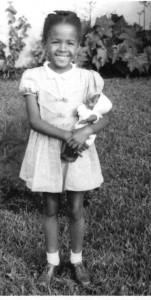
 Here is an excerpt from my memoir Split at the Root: A Memoir of Love and Lost Identity in which I write about having grown up as an exotic child among Whites in Guatemala City.
Here is an excerpt from my memoir Split at the Root: A Memoir of Love and Lost Identity in which I write about having grown up as an exotic child among Whites in Guatemala City.
“On my first day of school, Ruth neatly combed my hair and arranged it into four braids as usual. Zoilita had made a light blue dress with puffy sleeves and a sash that tied into a bow in the back. Over it I wore the blue sweater with mother of pearl buttons Mutti had knit for me. Mutti held my hand as we walked several blocks over a sweet-smelling carpet of mauve jacaranda petals that covered the sidewalks.
The school, a wooden two-story building with many windows, sat in the middle of a large block. As soon as we entered the grounds, Miss Lehnsen came out of the building to greet us. She shook my hand and said to Mutti that it was a particularly special day for her and brother, the director. They were honored to have Catana in their school. We were all smiling. Then Mutti kissed me good-bye, and Miss Lehnsen took my hand and accompanied me to my classroom.
The Lehnsens had fled Hitler’s Germany and had many Jewish children in the school. When Mutti talked to them about enrolling me, they were overjoyed. Accepting me could be seen as a gesture they bore no ill feelings toward the Guatemalan German community. I was, and yet was not, a German child. Being a German child was a distinction I particularly cherished.
My grades were excellent throughout, and I burst with pride at report card time when, during cocktails and before dinner, the remarkable outcomes and the teacher’s positive comments were discussed in detail. One day, early in third grade, I heard Mutti say that such consistent excellence should be rewarded with a scholarship. She told me it would be an honor and I gathered that she really wanted me to receive the distinction. Soon enough I ended up horrified at discovering that students with scholarships went to school for less, sometimes no money. I related that to poverty and certainly did not want the association. Poor people had dark skin. It was a feature of mine I resented. I didn’t want anyone to think I belonged to the poor as well. And so: my grades began to slip. Eventually I was so successful at being a mediocre student that I was in serious peril of having to repeat fourth grade. A little more effort in my work, and the grades improved and I passed easily. It was no big deal for me, but a great relief for Mutti, who never found out what had caused the academic deterioration.
As all children, I interacted with society according to my parent’s social standing, and I figured that in order to be as White as my German friends I had to be mediocre, as I sometimes heard they were. It became etched in my psyche that White people excelled by being and connections, not by effort, certainly not knowledge. I had heard that this one or the other one was not particularly smart. From what I saw, this one or the other one was living in a nice house, had servants, drove a car. Those of whom I’d heard comments regarding superior intelligence were maids or gardeners. Yet they had nothing but long hours of tiring work to show for it. By the time I was 8 at most, it was clear to me that only dark people had to work hard, and in spite of that they would never achieve the social rank commensurate with the effort they expended. Neither their loyalty to the boss nor the integrity of their work, nor the keen knowledge in their field ever mattered: they were inferior because of their color. They were not paid more for their expertise and they could never leave the conditions into which they had been born.”
Read more: Split at the Root: A Memoir of Love and Lost Identity (Kindle) or Split at the Root: A Memoir of Love and Lost Identity.
SEP
